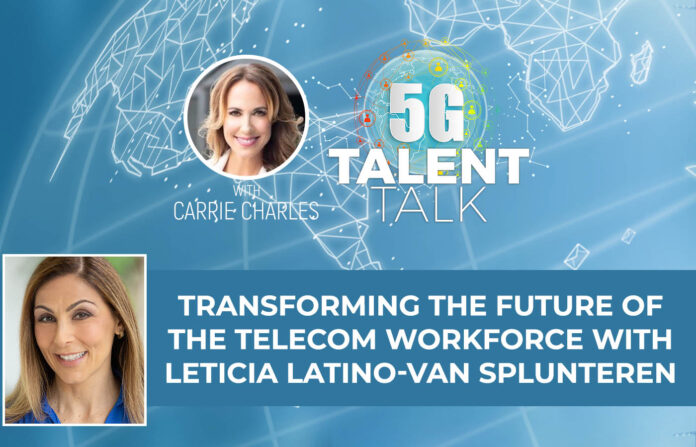Joining host Carrie Charles on today’s episode of 5G Talent Talk is Leticia Latino Van-Splunteren, CEO of Neptuno USA. Together, they explore the way 5G technology is transforming the telecom industry and discuss the challenges and opportunities for building a talented and diverse workforce in this rapidly evolving field.
In this episode, you’ll learn about the key skills and knowledge that are in high demand for 5G jobs, the role of lifelong learning in building a successful career in telecom, and the importance of mentorship and collaboration for advancing diversity and inclusion in the workplace. In this episode, Leticia shares her insights on how companies can attract and retain top talent in a highly competitive market, and why embracing innovation is essential for staying ahead in the fast-paced world of 5G.
Whether you’re a seasoned professional or just starting out in the industry, tune in to 5G Talent Talk and gain valuable insights and inspiration for transforming your career and your organization in the new world of work.
—
Watch the episode here
Listen to the podcast here
Transforming the Future of the Telecom Workforce with Leticia Latino-Van Splunteren
I’m very excited to bring to you this amazing guest. She is a friend of mine. She’s a leader in our industry. Her name is Leticia Latino Van-Splunteren. Leticia has over 25 years of experience in the telecom industry. She’s also the CEO of Neptuno USA, which we’re going to learn about. First, I want to tell you about her awards and her recognitions.
Leticia is a recipient of the Women in IoT award by Connected Magazine, Revolutionary CEOs by Aspioneer, and one of the 30 Most Influential Leaders in Tech by Insight Success. She chaired for two years the Job Skills and Training Working Group of the FCC Broadband Advisory Development Committee. She serves as a full member of the FCC Equity and Diversity Innovation and Access Working Group.
She was also directly appointed by the FCC to the Telecommunications Interagency Working Group, which was charged with presenting to Congress a recommendations report on the state of the US Telecom Workforce. In addition to all of this, Leticia is an Amazon bestselling author. She’s an international speaker. She’s an amazing mentor to young women and a big advocate of nurturing Human Connections through her Back2Basics Podcast. Leticia, it’s so awesome to have you on the show. I’ve been waiting for this for so long.
Thank you. If you could see me, I’m blushing. I’m like, “Who’s that person that she’s ringing about? That cannot be me.” Thank you for having me.
Many people respect you in our industry. You’ve done so much for us. I want to know about your journey and how you got to this role that you’re in.
I can tell you one thing. I got to where I am without planning too much, taking one day at a time, and following my intuition from a very young age. I was born into telecom because my father had a telecommunications company. He’s a tower manufacturer. He immigrated from Italy to Venezuela. From very early on, I was playing around with construction materials over at the side.
One thing that I have very clear is I do not want to go work for the family business. From very early on, I want to make my own path and I want to be known for my own merit. When I started my career, I rejected the idea to join telecommunications. After I did my Master’s, I went to work for Merrill Lynch and started a very different career path.
It didn’t take me long to recognize that this is not for me. I’m not liking this too much. I was attuned to what made me tick, my podcast at that time. History has it that Nortel Networks offered me a job in telecommunications, which I am resistant to for so long. That’s how I started my telecom career. It has been amazing. It’s an amazing industry to be in.
Tell us the story about Neptuno USA, who you serve, what you do, and the market.
It’s an interesting angle because my father founded our company. I was born and raised in Venezuela, although both my parents are Italian. It’s a great country. I love my country dearly. Unfortunately, we encountered serious political issues back in ’98. We have lived 22 years of COVID-like conditions when people complain about having to manage a company in very bad conditions.
Anybody that has a company in Venezuela has had to deal with difficult situations to the point where we almost lost everything in our factory, 50 years of work. When I decided to leave Nortel, I lived through the demise of going from 120,000 people company, a leader in the industry, to going belly up. That whole process of Corporate America taught me a lot in terms of how you cannot put all your eggs into what a company that you work for is.
You have to be yourself. You have to brand yourself. When I talk about it with people, and they say we as the company, that’s a good thing that you feel part of the group. A lot of people attach their own value to the company rather than to themselves. Back in 2002, I told my dad, “We have to have a plan B because our international customers were concerned that we were a Venezuelan-based company.”
Be yourself. Brand yourself.
That’s how we decided to open Neptuno USA in Florida mostly as a support to the region. We are very strong. We have supplied over 10,000 towers that we have engineered, manufactured, and installed in South America mostly at that time. When we started in 2002, the idea was always to support Latin America from Miami.
As we kept going and as I got more involved in the US, we decided maybe we can help the United States, too. We started learning more about the market. It wasn’t until 2015 that we said, “Let’s be a player, even if we don’t manufacture towers here in the United States.” It’s a harder product to sell. I developed a whole new array of products in terms of virtual twins.
We are credited with being one of the first companies that created the lighter base point cloud of towers. Now, they are in the mainstream after many years. We’ve been at it for a long time, using artificial intelligence to create tower mapping and antenna mounts. We’re leveraging the engineering we have to bring better products, asset tracking software, and all the operational aspects of the business.
You’ve been in the industry for a long time, over 25 years. What biggest challenges do you see companies are facing right now?
To me, in telecommunications, what I’ve always observed is that we are a very technologically advanced industry on the front end. We sell everybody 5G and 6G, and we want to go so fast. The operational aspect of things, we are extremely old-fashioned. There’s a huge resistance to change on the operations of things.
This is what expands and augments even the workforce issue, because then we have our workers doing a lot of stuff manually. We have an asset tracking software that we’ve been promoting for a long time. You offer this and you show potential customers how they’re going to save money. My guys are never going to use this.
I’ve always said that our biggest competitor is not another product. It’s an action. It’s when you have managers that don’t want to disrupt, but the industry is being disrupted by technology. I see that as a huge problem because it’s creating systemic problems that are not easily solvable unless you have leaders that are willing to embrace change on all fronts.
We’re facing a workforce crisis with not having enough people. What you mentioned with the leaders that are resistant to that technological change, all of that is a recipe for a big crisis that we’re facing if we are not already feeling it now. You sit on many committees and you’ve been directly involved in providing solutions to some of these things. What do you see as a strategy or an idea that could help us to create a stronger workforce as we move forward?
Get involved in committees. People think it’s a waste of time. It’s an opportunity to have your thought leadership and experience and filter into what decisions are being made at a higher level. There’s been a big push in creating pathways. We can all agree that the telecom workforce doesn’t have a clear path. If I join the workforce, what can I be or grow to? It’s not a one-sided thing. You have associations like WIA and NATE. Industry associations working on putting a curriculum together and apprenticeship tracks. That provides whoever joins us with a clear path into, “This is what you can evolve to,” and you don’t get stuck.
Some people get afraid like, “Technology changes. Am I going to have a job in a few years?” Technology has been changing. My dad joined this industry several years ago, and he’s evolved with it. Unless you create pathways for people to evolve in an organized way, it’s going to be very challenged. The good news is everybody has identified the big issue. There are a lot of tracks right now that didn’t exist a few years ago that are very clear pathways to becoming a telecommunication professional.

I have a question about the competitive nature we’re dealing with when kids come out of high school or college, and they’re looking at telecom as an option versus other industries. There are some other areas that pay more, and you don’t have to be outside in the freezing cold or climbing a tower. What are the challenges that we’re facing around how much we can pay these people to get more talent in the industry? I can feel and hear everyone brainstorming on how can we get more training and people into this industry?” Once they’re here, we’re now offering them the pay. That’s very challenging for some companies to be able to keep up and pay enough to attract and retain good talent.
It’s a great point because we have been seeing these jobs as you get the people in that job and you leave them there. There’s no plan. People then start jumping ships for an extra $1 from one company to another company. That’s why apprenticeship has been proven to create loyalty, because whoever gets on that track says, “I can see this person transitioning into a leadership role.”
You don’t leave them as tower technicians or fiber technicians. You have to transition them. We’re going to have better companies and industries if we acknowledge that. If you know what’s happening in the field, you are going to be a better operation altogether. What I see right now is a complete disconnect between office work and fieldwork.
You have people in the office making demands, “This is taking too long,” because they’ve never been in a construction site or a site. When they go there and they see the trucks of equipment our technicians in general have to offload and climb the tower. If you put in perspective what needs to happen, people are just enough. The more you come with that transition, this is a stepping stone into getting into a leadership role or an office role. That happens for some companies, but most are not tackling it like that. They want to have that resource forever in that position. It cannot work like that.

I want to talk a bit about your company culture because as you said, you have the operations side, the office, and then you also have the people in the field. How do you design a successful company’s culture with all of those different people doing different things?
I’m exactly living that right now because we go internationally. We have a company with many crews. A lot of them are in the third generation. The grandparents started with my dad. The culture is very strong where the owner of the company was alongside them living. You cannot impose culture. You cannot just write a mission statement that sounds beautiful, but then day-to-day, you live something completely different.
That’s how you establish it. Now, I am on that challenge because I have my first cruise in the US. Not too long ago, I was onsite with them. We went to lunch. They were saying they work for other companies and say, “No CEO has ever sat with us over lunch.” That’s how you get real with the challenges. When you sit with them, you make them comfortable, you are one of the team, and you start getting feedback from the field.
That creates culture. It’s setting an example. When words are different from actions, it’s very detrimental to the company culture, because then nobody believes it when they hear it. I see so many companies that brag about being one thing, and people behind the back say, “Oh, please.” Everybody knows. It’s like having a cheating husband or wife, and they portray to be perfect, and everybody knows what’s going around. That’s something very important to be consistent with whatever culture you want to set in.

It’s clear that you lead by example and you are such a passionate leader. I’ve heard so much about your leadership style. Tell me in your own words. What makes an extraordinary leader?
I believe in somebody that wants to make the world a better place. it sounds cheesy, but using our companies and our business for the greater good is an opportunity that leaders have. When you are concerned about profit and how you advance your own self into whatever your goals are, even if you have the title and the CEO and people say you’re a leader, you’re falling short. We have to dream big as leaders. Be passionate. Be empathetic. Put yourself in other people’s shoes. Be consistent into what you have. I do believe that you have to be passionate and have your purpose very clear to be able to showcase leadership.
Leticia, you are a role model for women, not just in our industry, but everywhere. There have been so much conversation around bringing more women into the telecom industry. How do we do it? How do we bring women in? How do we keep women and advance women? What are your thoughts?
I believe that we have to start by breaking gender bias. To me, it’s all about gender bias. You go into some countries, Latin America. You always hear the parents saying to the boy, “You’re going to be the engineer. The girl is going to be the nurse.” That is gender bias. Right there, you’re putting a label into that little girl’s mind that she cannot be the engineer of the family.
We have to break that and present everybody. I’m not a feminist. I’m an equalitarian. People see me pushing women’s causes, and I say, “I push the equality. Everybody should have equal opportunity.” That’s how we have to present it to the young people, because when we do that, then the girls’ minds open up and say, “This is an opportunity for me.”
Everybody should have equal opportunity. That’s how we have to present it to the young people, because when we do that, then the girls’ minds open up and say, “This is an opportunity for me.”
This is why we are living in such exciting times. The Chairwoman of the FCC for the first time in over 80 years is a woman. That is already something that I know younger girls can look up to and say, “This can be me.” We can put a face to the title. We have to be active in mentoring and encouraging young girls. I’m a big proponent of doing career days at school. I always go and talk at my kids’ school about telecom. People are, “What? It’s not a lawyer.” The typical jobs that are coming here, and now, they’re presenting me with a tower. The Vertical Freedom movie is what I showed last time. it’s amazing to see the reaction on everybody’s faces, boys and girls.
We need to be doing more of that. I truly believe that our solution starts when our children are young, in middle school and high school. What challenges have you faced as a woman entrepreneur, and also in this industry? Are there any challenges that you’ve faced over your career and how have you overcome them?
In 25 years, I faced many. I always joke around in the good sense of the world that I’m going to write a book called Things I’ve done for a PO. I want to invite all salespeople to join in. You can think one way, but it’s about other things like wedding dresses being flown from one country to the other. The biggest challenge is it goes along with being taken seriously. As a woman and younger, when I started, I found myself that I had very good relationships. People generally liked me. I don’t have any big grudges with anybody. To translate that into an opportunity to beat and contract work has been a huge challenge, especially in the United States.
It has been like how do you translate a good relationship and the fact that people take a meeting with you and they like your company to, “Now, I’m going to give you a chance to show what you can do?” That has been a big one and is what every woman has a challenge with. I don’t want to be invited to the table because I’m a woman. I want to be invited because I’m good at what I do, and my perspective can bring value.
Equality is not being invited to the table because you’re a woman. It’s being invited because you’re good at what you do, and your perspective can bring value.
Even now, you get offered opportunities. It’s challenging to say no, because for the first time, they’re hearing about this. It’s like, “I want to join,” but then you have to be strategic into, “Why am I being invited? What’s the ultimate purpose of this?” I would say that. Also, being a small diverse business in the United States is challenging because a lot of people are on board with diversity.
That’s the first layer when you go into digging deeper into what a smaller company has to provide to do work with the big guys in telecom. It’s almost impossible when you get presented on MSA. This is something I’m very passionate about. Also, on the equity and diversity committee, we need to be aware what we are asking from small contractors. If we don’t change the way this is done, we’re never going to reach the goal of be being more inclusive in our industry.
What advice would you give to a young person starting out in our industry?
I would say, don’t worry too much with checking the boxes and ticking, “I have this. I have that.” Everybody is on such a rush to complete a path that has been established for them. Look how can you be different. What is your superpower? What is that thing that you’re good at? Build your skills around it. I am always surprised how people don’t pay attention to languages, for instance.
Don’t worry too much about checking the boxes and ticking, “I have this, I have that.” Everybody is in such a rush to complete a path that has been established for them.
I’m a big proponent. The more languages you speak, you’re going to be in some meeting where you are going to be different just because you can speak their language. There are skills that are often overlooked that will make you different. If you’re young and starting, don’t try to follow linear path. Try to be more strategic about what you bring to the table. How can you be different in an interview and in your environment? If you’re the same as everybody else, how am I going to notice you? I want to see differences. I don’t want to see similarities.
That echoes what you said earlier about personal branding, which is so important that you brand yourself personally along with branding your company and who you represent. Both are equally as important. You’ve done that beautifully. Along that same line, what’s next for you? Let’s look at the future. What’s next for Neptuno? What’s next for Leticia?
I get asked that a lot. I’m very excited because we are entering a moment in history. It’s very different. Everything is transitioning. We’ve been disrupted. The ESG, Environment, Social, and Governance, component of things is now very predominant. Companies that don’t embrace, adapt, and implement ESG criteria are going to struggle very much.
Being the dreamer that I am, if you read the 17 Sustainable Development Goals that are part of that macro blueprint, this is great because gender equality is only number five. It’s 1 out of 17. People think it’s all about gender equality. No, that’s part of a bigger agenda. I’m big embracer of that. Personally, I’m becoming an expert as much as I can on ESG matters.
Also, making the company sustainable by design. This is not something I said. It’s something a dear friend says of her company. I admire her. I’m still in that. It’s great. I’m starting to create the offering of Neptuno even more intentional about ESG. Not only the environmental part, but the social governance part. How we give better options to our workers is huge.
Workforce is right there on that ESG component even if people think it’s only about the environment. No, it’s about making sure your crews are happy. I’m rejecting work all over the United States because my crews are Florida-based. I want them to be close to their family. That’s what brings them a better quality of life, which is one of the sustainable goals. When we design how we operate around that, we’re going to end up in a better place, not only as a company and as a nation, but as a world.

Every time I talk to you, Leticia, I just get so inspired. I bet your podcast is incredible. I wanted to tell the audience where they can find your podcast. It’s called Back2Basics. Can we find it anywhere, everywhere?
It streams everywhere. It’s Back2Basics: Reconnecting to the essence of YOU. You can also check my webpage, www.LeticiaLatino.com. There’s every aspect of myself. That’s something I did a few years back when people said, “They think of you as towers only.” I’m like, “I’m more than towers. I’m not only towers.” I decided to create that webpage where all aspects of myself are there.
I want to chime in that the podcast is something that I knew in my corporate life, I was missing something. I love my job, but I felt that I wanted to do more, so I created a podcast. I don’t monetize the podcast at all, but it has given me an opportunity to speak with the most incredible people. You have an open invitation. I’ve said this before. We are over 200 episodes, and three years on the air. If there’s anything out there that you are inspired to do, because you have a corporate job doesn’t mean that you cannot pursue it. I’m a big proponent of that. Find what makes you tick besides what you’re doing right now and make it happen.
If there’s anything out there that you are inspired to do, not because you have a corporate job, it means that you cannot pursue it. Find what makes you tick besides what you’re doing right now and make it happen.
Leticia, this has been wonderful. Thanks so much for having this conversation. I can’t wait to see you again. Thank you.
Thank you.
Important Links
About Leticia Latino Van-Splunteren
 With over 25 years of experience in the Telecom Industry Leticia Latino van-Splunteren went from working for Merrill Lynch and Telecom Giant Nortel Networks to accepting the challenge of extending the legacy of establishing her family business in the US back in 2002. Neptuno Group was originally founded by her father in 1972 in South America where they helped deploy some of the first Cellular Networks in the region and where they have built over 10,000 Towers.
With over 25 years of experience in the Telecom Industry Leticia Latino van-Splunteren went from working for Merrill Lynch and Telecom Giant Nortel Networks to accepting the challenge of extending the legacy of establishing her family business in the US back in 2002. Neptuno Group was originally founded by her father in 1972 in South America where they helped deploy some of the first Cellular Networks in the region and where they have built over 10,000 Towers.
Amongst many other recognitions, Leticia is a recipient of the Women in IoT award by Connected Magazine, Revolutionary CEO’s by Aspioneer and one of the 30 most influential Leaders in Tech by Insight Success. She chaired for two years, the Jobs Skills and Training Working Group of the FCC Broadband Advisory Development Committee and currently serves as a full member of the FCC Equity and Diversity Innovation and Access Working Group. She was also directly appointed by FCC Chairwoman Rosenworcel to the Telecommunications Interagency Working Group which was charged, as per the Infrastructure Investment Jobs Act, to present to US Congress with a recommendations report on the state of the US Telecom Workforce.
In addition, Leticia is an Amazon Bestseller author, International speaker, mentor to young women and a big advocate of nurturing “Human Connections” through her Back2Basics Podcast.

